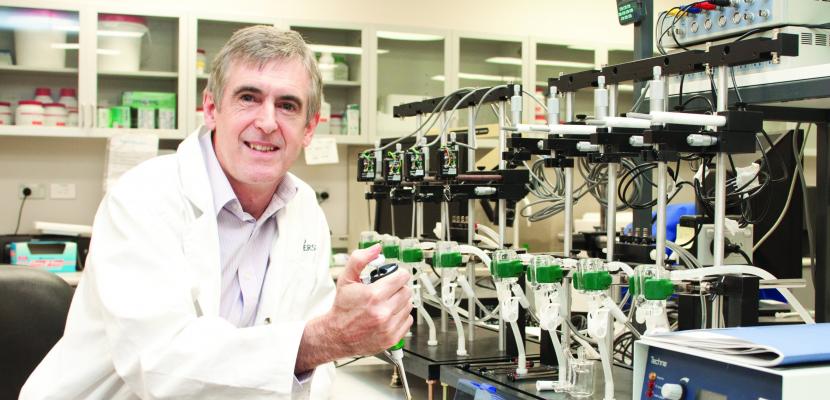
Bond University has again stepped up its medical research commitment, with the establishment of the new Centre for Urology Research.
The centre will be directed by Professor Russ Chess-Williams, who has spearheaded prostate and bladder research at the university since his appointment in 2006.
He will head 10 studies currently underway into areas including enlarged prostate, unstable bladder, cancer treatments, stress incontinence, kidney stones and erectile dysfunction.
In total, nine Bond staff will work within the centre, along with seven PhD students, two Masters students, two Honours students and five medical laboratory science students.
The centre will work in collaboration with clinical urologists at John Flynn Hospital and radiation oncologists at GenesisCare in Southport and also other researchers at Griffith University.
The Centre for Urology is the fourth research centre to be established within Bond’s expanding Faculty of Health and Medical Science. It joins the Clem Jones Research Centre for Stem Cells and Tissue Regenerative Therapies, the Centre for Research in Evidence-Based Practice, and the Collaborative Research Network for Advancing Exercise and Sports Science.
Bond University Health Sciences and Medicine Executive Dean, Professor Helen Chenery, said the establishment of the new centre formalised Bond’s commitment to urology research.
“This is an area Bond has been active in for a decade and will continue to be one of our major research focuses going forward,” she said.
“Bladder and prostate issues affect thousands of Australians every year, with about 20,000 new cases of prostate cancer and 2500 cases of bladder cancer diagnosed each year alone.
“The important work being undertaken by the Centre for Urology Research will help provide the pharmaceutical industry with new targets for the development of alternative treatments, which will ultimately have a wide reaching positive impact on the community.”
Professor Chess-Williams said one of the major urology studies currently underway at Bond was investigating the impact of a group of drugs, known as alpha-blockers, on prostate cancer treatment.
“These drugs are generally used to treat high blood pressure or enlarged prostate, and we find that at higher doses they also kill cancer cells. We are now investigating whether they can be used to enhance treatments such as chemotherapy and radiation,” he said.
“We have found radiation treatment, in particular, may be more efficient if the patient is on these drugs at the time they receive radiotherapy.
“Like most cancer treatments, with radiotherapy there are significant side effects after treatment, so if we do find a correlation it may mean lower doses or shorter treatment periods, and therefore less side effects for patients.”
Professor Chess-Williams said the research involved growing human prostate cancer cells in a laboratory at Bond, which were taken to GenesisCare for radiation treatment to investigate if the alpha-blockers improved treatment. Along with the experimental studies in the laboratory the team is also examining existing patient records. A number of patients already take these drugs to stabilise other prostate and bladder problems, and the study is looking to see if those who were taking the blockers while receiving radiation had a better outcome.
The Centre has also just completed a study, funded by the Cancer Council Queensland, into the side effects caused by chemotherapy treatment for bladder cancer.
“The treatment generally involves cytotoxic drugs being instilled inside the bladder to treat the cancer, but these can also cause damage to the non-cancerous parts of the bladder,” said Professor Chess-Williams.
“We found these cytotoxic drugs increase the release of chemicals that stimulate the sensory nerves, leading to pain and frequent feelings of urgently needing to urinate.
“We also found the normal tissue became badly inflamed, so there may be a need to look at anti-inflammatory treatments to improve the outcomes for patients.”